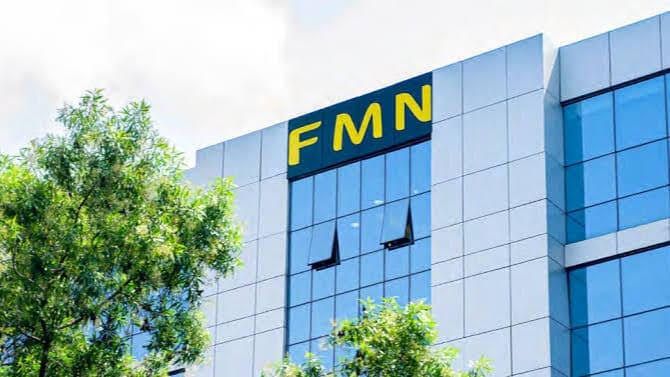By Adeayo Adebiyi,Ppulse Mix
Copyright pulse

Flour Mills of Nigeria (FMN) is that brand name that brings to mind great nostalgic memories and cherished moments because the brand is as old as Nigeria – both are 65 this year. The FMN story is that of resilience and innovation driven by the need to creatively respond to the consumers’ nutritional needs while driving the Nation’s agenda for food security.
From the first bag of flour that graced Nigerian pantries in 1960 to the modern innovations feeding today’s families, FMN has been more than just a corporate brand name; it’s been a trusted partner in the nation’s progress, a silent companion in our kitchens, and a golden thread weaving through generations of Nigerian food culture and industrial revolution.
Let’s take a nostalgic journey through time with the brand that has been nourishing Nigerian families for just as long. These are 10 unforgettable memories, flavours, and innovative strides that have made FMN synonymous with nation-building, quality, tradition, and the unmistakable taste of home.
1. That First Taste of “Golden” Excellence (The ”60s)
In 1960, as Nigeria took its first steps as an independent nation, Golden Penny flour was quietly making its debut in Lagos markets. For many families, this wasn’t just flour; it was a promise. A promise of fluffy bread that would rise perfectly every morning, of crispy puff-puff that would bring smiles to children’s faces, and of countless meals that would nourish growing families.
The timing couldn’t have been more perfect. As Nigerians embraced their newfound independence, they were also embracing new possibilities in their kitchens.
Those who remember the early days speak of the distinctive golden packaging that stood out among other brands, and how quickly word spread from neighbour to neighbour as delicious bread became the star gift of travellers from cities to villages.
2. The Golden Generation of Bakers
Behind every successful bakery in Nigeria, you’ll likely find stories of Golden Penny flour. From the ambitious entrepreneur who started with a small oven in their backyard to the established bakeries that serve hundreds of customers daily, Golden Penny has been the reliable foundation for countless success stories. From Lagos to Onitsha and to Kano, success stories of bakers abound, both old-generation family bakeries and a new generation of young entrepreneurs who left their corporate jobs and have made names for themselves on millions of breakfast tables across the nation.
The reliability of Golden Penny flour has given bakers the confidence to expand their offerings, experiment with new recipes to create Instagram-worthy pastries and cakes that would make their predecessors proud, and build customer trust. When your livelihood depends on consistent results, you need products you can trust completely. For thousands of Nigerian bakers, Golden Penny hasn’t just been a supplier; it’s been a partner in their journey to success.
3. Nigeria’s First “Golden Age” of Pasta (The ’70s)
When Spaghetti and Macaroni Became Nigerian Staples
Before the 1970s, pasta was largely unknown in most Nigerian homes. Then came Golden Penny Spaghetti and Macaroni, and suddenly, Sunday dinners had a new star. The introduction of these pasta products didn’t just add variety to Nigerian meals; it started a culinary revolution.
Nigerian mothers, always creative, quickly discovered that spaghetti could be “Nigerianised” with tomatoes, peppers, and local spices. The result? A unique fusion that became a weekend tradition xin households across the country.
From simple spaghetti and stew to elaborate macaroni and cheese adaptations using local ingredients, these products helped expand the Nigerian palate while maintaining the comfort of familiar flavours.
4. The Ultimate ’80s Comfort Food: Semovita
How Semovita Became the Soul of Nigerian Meals
The 1980s brought economic challenges, but they also brought Golden Penny Semovita, a product that would become synonymous with comfort, tradition, and the heart of refined Nigerian dining. For many families navigating the economic uncertainties of the decade, Semovita represented both affordability and satisfaction.
What made Golden Penny Semovita special wasn’t just its smooth texture or easy preparation, it was how perfectly it paired with every Nigerian soup imaginable. Whether it was egusi with bitter leaf, ogbono with stockfish, or a simple pepper soup, Semovita provided the perfect canvas for the bold flavours of Nigerian cuisine.
For many Nigerians, the smell of Semovita cooking still triggers memories of family dinners, animated conversations around the dining table, and the warmth of being home.
5. A Noodle Revolution for the Kids (The ’90s)
When Cooking Was Made Convenient for a New Generation
The 1990s were all about convenience, and Golden Penny’s range of instant noodles perfectly captured the spirit of the decade. As more Nigerian women entered the workforce and life became increasingly fast-paced, these noodles became a lifesaver for busy parents and an exciting discovery for children.
But Golden Penny noodles weren’t just about speed, they were about creativity. Nigerian families quickly learned to jazz them up with local ingredients: adding fresh tomatoes, onions, eggs, dried fish, suya, or even leftover stew. What started as a simple instant meal became a canvas for culinary creativity.
The ’90s kids who grew up with these noodles remember the excitement of choosing between flavours, the satisfaction of a perfectly cooked bowl after school, and how these simple meals brought friends and roommates together around shared experiences.
6. From Farm to Table: The Story Behind the Ingredients
FMN’s Commitment to Local Sourcing and Quality
Long before “farm to table” became a trendy concept, FMN was quietly implementing backward integration strategies that would benefit both Nigerian farmers and consumers. And it wasn’t just about business, it was about building a sustainable ecosystem that supported local communities while ensuring the highest quality products.
By sourcing grains from Nigerian farms and supporting local agriculture through cassava, palm fruit, sugar cane, and soybean cultivation, FMN helped create employment opportunities in rural communities while maintaining strict quality controls. This approach meant that when families purchased the now popularGolden Penny products, they weren’t just buying food, they were supporting their fellow Nigerians and contributing to the country’s economic growth.
The commitment to local sourcing also meant fresher products with shorter supply chains, translating to better taste and nutritional value for consumers. Nigerian farmers who partnered with FMN found stable markets for their produce, enabling them to invest in better farming techniques and equipment.
This philosophy extended beyond just raw materials. FMN’s investment in local production facilities meant jobs for over four hundred thousand Nigerians, from factory workers to distributors, creating a ripple effect that strengthened communities across the country.
7. Sweetness Made in Nigeria (2013)
Sugar Content Localisation
When FMN’s Golden Sugar Company commissioned its state-of-the-art refinery in Niger State, it wasn’t just another factory opening; it was a declaration of independence from sugar imports. With a staggering production capacity of 750,000 tonnes, this facility became one of the largest sugar production centres in all of Africa, right here on Nigerian soil.
The Sunti Golden Sugar Estate achieved something remarkable: it became the first and only greenfield investment under the National Sugar Master Plan to actually start producing raw sugar. While others made plans and promises, FMN was busy turning sugar cane into reality and was adjudged the best performer with a 58% compliance and progress rating by the National Sugar Council. The sprawling estate in Niger State represented more than agricultural success, it embodied Nigeria’s potential for self-sufficiency.
Today, when families reach for Premium White Granulated Sugar for their morning tea, Granulated Brown Sugar for traditional treats, or those elegant Premium White Sugar Cubes for special occasions, they’re not just sweetening their drinks, they’re supporting Nigerian farmers, Nigerian workers, and Nigerian dreams of economic independence.
8. The Bagco Bag that Transformed Nigeria’s Packaging Industry Forever
In 1972, when most Nigerians were still adjusting to life in their second decade of independence, a quiet revolution was taking place in an industrial facility in Lagos. Flour Mills of Nigeria had a problem: the cotton bags used to package their flour were expensive and often in short supply.
And so the ubiquitous Bagco bag was created, resulting in the introduction of Nigeria’s first woven polypropylene sacks, an innovation that would transform not just FMN’s operations, but an entire industry. These weren’t ordinary bags. They were “breathing” sacks that proved more durable, cost-effective, and suitable for Nigeria’s climate than their cotton predecessors. What started as an in-house solution to FMN’s packaging needs became a game-changer for the entire country.
Suddenly, industries across Nigeria, from cement manufacturers to fertilizer producers, sugar refineries to salt companies, had access to superior packaging that could withstand the rigours of Nigerian transportation and storage conditions. Bagco didn’t just solve a problem; it created an entirely new standard that the nation adopted.
Decades later, Bagco introduced the revolutionary ZeroFly® Storage Bag, the first insecticide-incorporated woven polypropylene bag in Nigeria. For farmers who had watched helplessly as pests destroyed their harvest during storage, this was nothing short of miraculous. These bags provided a safer, more effective way to protect grains without fumigation or pesticide residues, turning post-harvest losses from a nightmare into a manageable challenge.
9. More Than Just Food: FMN’s Role in Communities
Building Connections Beyond the KitchenFMN’s impact extends far beyond individual nourishment into the heart of Nigerian communities. For 65 years, the brand has consistently supported festivals, cultural events, and community initiatives that bring people together around food and celebration.
From sponsoring local cooking competitions that showcase traditional recipes to supporting cultural festivals that celebrate Nigeria’s diverse food heritage, FMN has helped preserve and promote Nigerian culinary traditions. These events have provided platforms for home cooks to share their skills, for young people to learn traditional cooking methods, and for communities to come together in celebration.
The brand’s involvement in educational programs has also helped improve nutrition awareness in communities, teaching families how to prepare balanced, affordable meals using Golden Penny products. School feeding programs supported by FMN have ensured that thousands of children across Nigeria have access to nutritious meals, contributing to better health and educational outcomes.
During challenging times, including economic downturns and natural disasters, FMN has consistently been part of relief efforts, providing essential food products to affected communities. This commitment to social responsibility has made FMN more than a brand, it’s become a trusted member of the Nigerian family.
10. A Toast to the Future
FMN’s Modern Innovations and Tomorrow’s Promise
As FMN celebrates 65 years of nourishing Nigerian families, the brand continues to innovate and support innovation through its Prize for Innovation Challenge, while staying true to its core values of quality, nutrition, and affordability.
The brand’s commitment to sustainability includes improved packaging materials and continued investment in local sourcing that supports Nigerian farmers and reduces environmental impact.
Educational partnerships with culinary schools and nutrition programs ensure that future generations of Nigerian cooks and food entrepreneurs have access to both traditional knowledge and modern techniques. Its innovation labs continue to develop products that meet evolving nutritional needs while maintaining the familiar tastes that have defined the brand for decades.
As we look toward the future, FMN’s vision extends beyond just feeding families; it’s about nourishing dreams, supporting communities, and continuing to be an integral part of Nigeria’s story.
As we conclude this golden journey through six and a half decades of memories, flavours, and moments, one thing remains clear: FMN hasn’t just been making food products; it’s been making memories.
Here’s to FMN at 65, may the golden moments continue for generations to come.
#FeaturedPost



